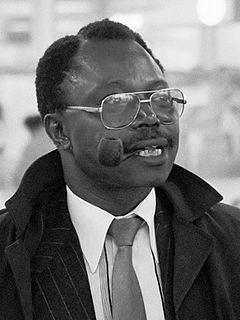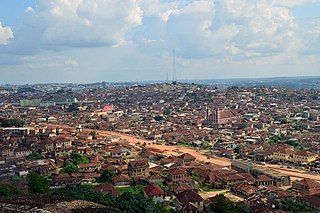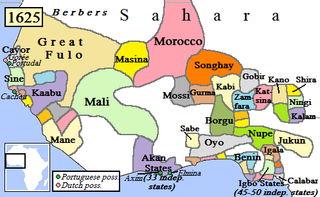
Adebayo Adedeji was a Nigerian economist and academic. A full-fledged Professor at the age of 36 years, he was Nigeria's Federal Commissioner for Economic Development & Reconstruction from 1971 to 1975. He was responsible for the economic development and reconstruction of post-civil war Nigeria. In June 1975, he was appointed Executive Secretary of the United Nations Economic Commission for Africa and remained in this position until July 1991. Adedeji wrote the Lagos Plan of Action of 1980 that was adopted by the UN and OAU. On his return to Nigeria, he founded the African Centre for Development and Strategic Studies (ACDESS), a non-governmental independent continental non-profit, think-tank dedicated to multi-disciplinary and strategic studies on and for Africa. He received the national honor of Commander of the Federal Republic.

Ijebu-Ode is a town in Ogun State, SouthWesthern geopolitical zone in Nigeria, close to the A121 highway. The city is located 110 km by road north-east of Lagos; it is within 100 km of the Atlantic Ocean in the eastern part of Ogun State and possesses a warm tropical climate.

Ogun State is a state in southwestern Nigeria. Created in February 1976 from the former Western State, Ogun State borders Lagos State to the south, Oyo State and Osun State to the north, Ondo State, and the Republic of Benin to the west. Abeokuta is both Ogun State's capital and most populous city; other important cities in the state include Ijebu Ode, the former royal capital of the Ijebu Kingdom, and Sagamu, Nigeria's leading kola nut grower. Ogun State had a total population of 3,751,140 residents as of 2006.
Chief Hubert Adedeji Ogunde, D.Lit. was a Nigerian actor, playwright, theatre manager, and musician who founded the first contemporary professional theatrical company in Nigeria, the African Music Research Party, in 1945.

Lagos is the largest city and former capital of Nigeria and the largest megacity on the African continent in terms of population " Approx. 14.3m, It is also the 4th largest economy in Africa.
Adeyinka Oyekan II was Oba of Lagos from 1965 to 2003. He was the grandson of Oba Oyekan I.
Akitoye, sometimes wrongly referred to as Akintoye, reigned twice as Oba of Lagos; first, from 1841 to 1845, and a second time, from 1851 to 1853. His father was Oba Ologun Kutere and his siblings were Obas Osinlokun and Adele.

Nigerian traditional rulers often derive their titles from the rulers of independent states or communities that existed before the formation of modern Nigeria. Although they do not have formal political power, in many cases they continue to command respect from their people and have considerable influence.
Oloye Sir Kofoworola Adekunle "Kofo" Abayomi Kt M.D. was a Nigerian ophthalmologist and politician. He was one of the founders of the nationalist Lagos Youth Movement in 1934 and went on to have a distinguished public service career. His last major public assignment was as chairman of the Lagos Executive Development Board from 1958 until 1966.

Ogere, is an ancient town in the present Remo Division of Ogun State, Nigeria. The town was founded circa 1401 A.D. Ogere is part of the Ikenne Local Government area of Ogun State. The ancestral home of the Yorubas is Ile-Ife. Oduduwa is the ancestral father of all the Yorubas inside and outside Nigeria. The people of Ogere are Yorubas. They hailed from the ancestral home “Lagere in Ile-Ife” in two different emigrations led by Olipakala and Lowa-Lida respectively. The two are Ile-Ife crowned Princes.

Imota is a district in Ikorodu, Lagos State. Their leaders are called Oba Ranodu of Imota. They are Ijebu-speaking people.
This is a list of the royal titles of Yoruba monarchs. It is not in the order of seniority.
The Ecclesiastical Province of Lagos is one of the 14 ecclesiastical provinces of the Church of Nigeria. It comprises 13 dioceses. The first archbishop was the Most Rev. Ephraim Ademowo, since the province of Lagos was created, in 2002 until 2013. The current archbishop is the Most Rev. Michael Fape.
Oru-Ijebu is a semi-urban town located in Ijebu North local government area of Ogun State, South-Western Nigeria. It is bordered by Ago-Iwoye in Ogun State and shares close territorial boundaries with Ijebu Igbo, the headquarters of Ijebu North, Ogun state. The town is alternatively known as Ijebu-Oru and according to the 2006 census has a population of about 27,000 people. The traditional ruler and community leader of the town is called the Oloru of Oru-Ijebu and he is Oba Abdulrasaq Olufemi Adebanjo. The town houses a refugee camp which is located on the outskirts 500m away from the town, housing refugees from Liberia and Sierra-Leone. Oru town is rich in various types of precious stones and metals.

Moyegeso is the Oba (King) of Itele in Ijebu, Ogun-State, Nigeria. The present Moyegeso of Itele is Oba Mufutau Adesanya Kasali Iboriaran I. He ascended the throne on March 3, 2003. His predecessor was Oba Jones Adenola Ogunde Adeyoruwa II, who reigned from 1981 to 1996. All those who have reigned as the Moyegeso of Itele were direct descendants of Awujale Oba Moyegeso (1710–1725), - Ojigi Amoyegeso - the 41st Awujale of Ijebuland. As such, any prince aspiring to become the Moyegeso of Itele must be able to trace his ancestry to Idewon quarters in Ijebu Ode where Awujale Oba Moyegeso hailed from. There are two ruling houses that can present princes as candidates for the royal stool on rotational basis. They are as follows:

Itele, or Ijebu-Itele, is a town in the Ogun state of Nigeria, about 286 miles (460 km) from Abuja, the country's capital. The community is part of Ijebu-East LGA. It is considered a traditional state because it is headed by a king (Oba) with the royal title of Moyegeso, a part II Oba as stated in the official gazette in 1990 of the Ogun State Government. The incumbent is Oba Mufutau Adesanya Kasali Iboriaran I.
Mufutau Adesanya Kasali MFR is the present Oba Moyegeso of Itele in Ijebu-East, Ogun State, Nigeria.
Ologun Kutere reigned as Oba of Lagos from around the 1780s to around 1803. He succeeded Oba Eletu Kekere who reigned between 1775 and 1780. "Ologun" is the Yoruba word for "War General".
Kosoko was a member of the Ologun Kutere Lagos Royal Family who reigned as Oba of Lagos from 1845 to 1851. His father was Oba Osinlokun and his siblings were Idewu Ojulari, Olufunmi, Odunsi, Ladega, Ogunbambi, Akinsanya, Ogunjobi, Akimosa, Ibiyemi, Adebajo, Matimoju, Adeniyi, Isiyemi, Igbalu, Oresanya, and Idewu-Ojulari.






